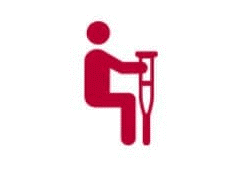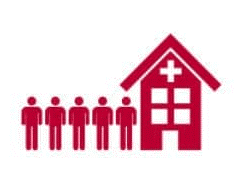
Project ECHO®: University of South Alabama (USA) is a partner of the University of New Mexico’s Health Sciences Project ECHO® (Extension for Community Healthcare Outcomes).
The goal of the USA College of Nursing (CON) ECHO® programs is to create centers of excellence dedicated to increasing knowledge and awareness of healthcare treatment in primary care.
EXPANDING THE CAPABILITY AND ACCESSIBILITY OF SPECIALTY CARE BY PRIMARY CARE
No cost to participate | Free continuing education credits available to eligible participants
Healthcare Providers – If your patients will benefit from high-quality health services, from local people they know and trust, then the USA CON ECHO® programs can provide interprofessional telementoring BECAUSE:


There aren't enough specialists to treat everyone who needs care, especially in rural
and underserved communities.

ECHO® trains primary care clinicians to provide specialty care services. This means more
people can get the care they need.

Patients get the right care, in the right place, at the right time. This improves outcomes and reduces cost.
PROJECT ECHO®
(Extension for Community Healthcare Outcomes)
- A revolutionary lifelong learning and guided-practice model that collects, curates,
and democratizes information
- Revolutionizes healthcare education & exponentially increases the workforce capacity
of primary care providers including doctors, nurses, social workers, counselors, and
other clinicians and professionals
- Aim of providing best-practice specialty care and reducing health disparities in underserved and remote areas of the state, nation, and world
- The model has four components:
- Access to scarce resources using technology
- Dissemination of “best-practices”/reducing disparities
- Case-based learning
- Outcome monitoring and evaluation.
- Revolutionizes healthcare education & exponentially increases the workforce capacity
of primary care providers including doctors, nurses, social workers, counselors, and
other clinicians and professionals
Learn more about the Project ECHO® model from the ECHO® model developer in his own words.
Learn more about the Project ECHO® example from India
Learn about the location of over 400 worldwide Project ECHO® Hubs, including the USA ECHO®Hub and USA CON ECHO®Programs
- Innovative telementoring using proven adult learning techniques and interactive video technology, the ECHO® model connects groups of community providers with specialists at centers of excellence in regular real-time collaborative sessions.
- A hub-and-spoke knowledge-sharing approach is implemented.
- Expert teams lead virtual clinics (hub), amplifying the capacity for providers (spokes) to deliver best-in-practice care to the underserved in their communities.
- The sessions, designed around case-based learning and mentorship, help local workers gain the expertise required to provide needed services.
- Providers gain skills and confidence.
- Specialists learn new approaches for applying their knowledge across diverse cultural and geographical contexts.
- As the capacity of the local workforce increases, lives improve.
Project ECHO® data indicate the benefits participating providers have experienced:
- Increased happiness with their jobs
- Increased confidence in their ability to offer specialty care for common, complex conditions
- Improved retention
- Reduced sense of isolation among providers
- Improved ability to ensure use of the latest best practices when caring for their patients
Learn more about the Project ECHO® data – Digital Repository
USA CON ECHO® Programs
Do any of the ECHO® benefits of patient care interest you?
Visit the USA CON ECHO® programs by clicking on the links below.
2024 USA CON ECHO® Programs - Retired
USA CON Sexual Assault Nursing Empowerment and Support (SOUTH SANES) ECHO®
2022 USA CON ECHO® Programs - Retired
USA CON Substance Use Disorder ECHO® Program
USA CON ECHO® programs are supported by the Health Resources and Service Administration (HRSA) of the U. S. Department of Health and Human Services (HHS) as part of awards, with zero percentage financed with nongovernmental sources. The contents are those of the author(s) and do not necessarily represent the official views of, nor an endorsement by HRSA, HHS, or the U. S. Government.






